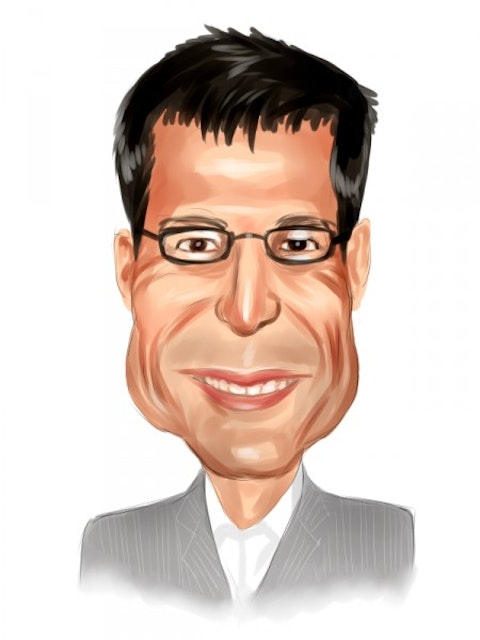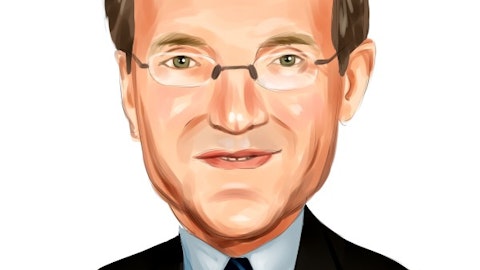After nearly 30 years at the top of the hedge fund business, Perry Capital is scaling down. At a time when hedge fund managers face intense pressure to lower management fees in order to provide investors with attractive returns, Perry Capital’s founders Richard Perry felt that “the industry and market headwinds against us have been strong, and the timing for success in our positions too unpredictable,” according to a letter sent to investors. During the first two decades, Perry Capital managed an average return of 15% without one single down year. However, its performance started to worsen and last year the fund lost roughly half of its assets. The fund still manages some $4 billion worth of assets, with $1.43 billion in equity positions as reported in its latest 13F filing.
Follow Richard Perry's Perry Capital
The firm plans to wind down its main fund, Perry Partners LP, looking to return cash to investors at the end of every quarter. They have divided their holdings into three categories depending on the estimated time needed to liquidate them: short-term (2-3 months), mid-term (6-12 months) and long-term (more than 12 months). The fund’s preferred shares in Fannie Mae and Freddie Mac are among the less liquid assets that fall into the last category. However, in this article, we’ll take a look at some of Perry Capital’s longer-term investments which are bound to face some pressure as the fund liquidates its positions.
While there are many metrics that investors can assess in the investment process, hedge fund sentiment is something that is often overlooked. However, hedge funds and other institutional investors allocate significant resources while making their bets and their long-term focus makes them the perfect investors to emulate. This is supported by our research, which determined that following the small-cap stocks that hedge funds are collectively bullish on can help a smaller investor beat the S&P 500 by around 95 basis points per month (see more details here).
#5 Ball Corporation
First up is Ball Corporation (NYSE:BLL), with Richard Perry having initiated a stake for his fund during the second quarter of 2015. As of the end of June 2016, the fund held 2.69 million shares worth some $194.5 million. Billionaire Ken Griffin is very bullish on Ball Corporation (NYSE:BLL), having built a fresh stake in the company during the second quarter. According to its latest 13F filing, Citadel amassed 2.08 million shares worth close to $150 million. During the second quarter, Ball Corporation (NYSE:BLL) completed the $6.1 billion acquisition of British can-maker Rexam, becoming one of the largest player in the market, holding 60% of the US market and 69% of the European beverage-can market. The deal will increase the company’s pricing power and will provide an estimated $300 million worth of synergies.
Follow Ball Corp (NYSE:BALL)
Follow Ball Corp (NYSE:BALL)
Receive real-time insider trading and news alerts
#4 Time Warner
Perry Capital’s stake in Time Warner Inc (NYSE:TWX) was also established during the second quarter of 2015. During the second quarter of this year, the fund cut its position by 7% to 888,500 shares valued at $65.3 million. At the end of June, David Einhorn‘s Greenlight Capital held the largest stake in Time Warner Inc (NYSE:TWX) among the funds followed by Insider Monkey, having reported ownership of 4.72 million shares, down 19% over the quarter. As it faced increased competition from online streaming services like Netflix, Inc. (NASDAQ:NFLX), Time Warner Inc (NYSE:TWX) was quick to adapt, having introduced the HBO Now service which has grown to approximately 1.0 million subscribers. The company’s film studio Warner Bros is having a down year, but has some promising franchises in the pipeline that are expected to turn things around.
Follow Warner Media Llc (NYSE:TWX)
Follow Warner Media Llc (NYSE:TWX)
Receive real-time insider trading and news alerts
#3 Ally Financial
Ally Financial Inc (NYSE:ALLY), Perry Capital’s largest position at the end of the second quarter, was also among its oldest. According to the fund’s latest 13F filing, this position was established during the second quarter of 2014 and amounted to 15.7 million shares, or 3.25% of the company’s outstanding stock. So far this year, Ally Financial Inc (NYSE:ALLY)’s stock has been trading in a range between $15 and $20 levels. Analysts recommend this stock mainly as a ‘Buy’ with an average price target of $25.40 per share, which represents an upside potential of roughly 35%. Robert Rodriguez and Steven Romick’s First Pacific Advisors LLC has bought Ally Financial Inc (NYSE:ALLY) shares aggressively during the second quarter and could use the chance to bolster their position when Perry Capital divests. At the end of June the fund reportedly held 10.7 million shares, up 306% from the previous quarter.
Follow Ally Financial Inc. (NYSE:ALLY)
Follow Ally Financial Inc. (NYSE:ALLY)
Receive real-time insider trading and news alerts
#2 AIG
Insurance giant American International Group Inc (NYSE:AIG) is also among the veterans, having made its way into Perry Capital’s equity portfolio during the third quarter of 2012. At the end of the most recent quarter, the fund reportedly held 3.7 million shares, down 30% from the previous quarter, worth $195.7 million at the end of June. Billionaire Carl Icahn is very interested in American International Group Inc (NYSE:AIG) as he continues to actively push the company towards a breakup, in order to rid itself from the “systemically important financial institution” tag that imposes some regulatory hurdles. At the end of June, the activist investor held 45.6 million shares, up 1% from the end of March. Together with John Paulson, Icahn has gained seats on American International Group Inc (NYSE:AIG)’s board of directors, although the company’s management is still resisting to implement Icahn’s proposal to break up the company.
Follow American International Group Inc. (NYSE:AIG)
Follow American International Group Inc. (NYSE:AIG)
Receive real-time insider trading and news alerts
#1 Johnson & Johnson
Perry Capital oldest equity bet that is still present in its equity portfolio is Johnson & Johnson (NYSE:JNJ). First reported at the end of the first quarter of 2001, the position amounted to 292,729 shares at the end of June, unchanged during the second quarter. With a history stretching back to the 19th century, Johnson & Johnson (NYSE:JNJ) is one of the most innovative companies in the healthcare sector. While it continues to sell some of its original products, the company has expanded into a number of industries, like medical devices or pharmaceutics. Johnson & Johnson has a market cap of $323 billion and pays an annual dividend of $3.20 per share, which provides investors with a 2.69% yield. Billionaire Ken Fisher is betting big on Johnson & Johnson (NYSE:JNJ), as his fund, Fisher Asset Management, held 10.8 million shares at the end of June, a position valued at $1.33 billion.
Follow Johnson & Johnson (NYSE:JNJ)
Follow Johnson & Johnson (NYSE:JNJ)
Receive real-time insider trading and news alerts
Disclosure: none.






